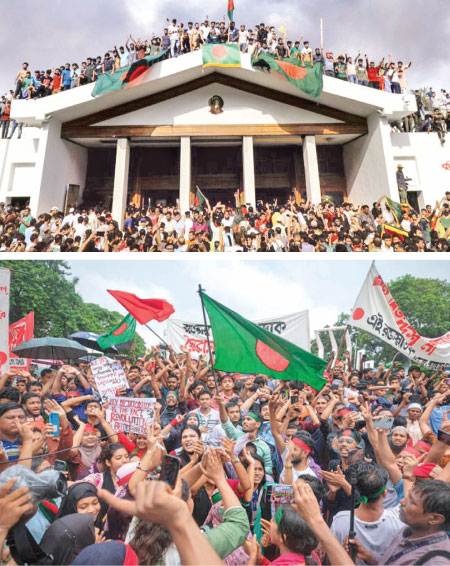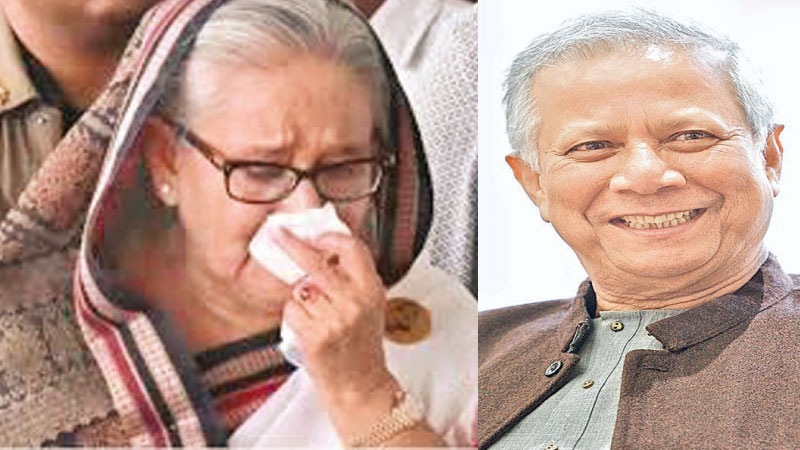Bangladesh, once heralded as an economic marvel in the Indian subcontinent, is now grappling with severe socio-economic turmoil following a political crisis that erupted in August 2024.
The resignation of Prime Minister Sheikh Hasina, her subsequent flight to India, and the formation of an interim Government with backing from the United States and neighbouring Pakistan have plunged the nation into political chaos and uncertainty.
The crisis was ignited by violent student protests over the quota system for Government jobs reserved for families of war heroes from the Bangladesh Liberation War.
In August 2024, these protests escalated into deadly clashes, resulting in the deaths of 130 people. The unrest led to Prime Minister Hasina’s departure from office and her escape to India. Protesters stormed the Prime Minister’s residence and Government buildings, causing widespread damage, arson, and looting.
Compounding the crisis, Bangladesh’s economy was already under severe strain. The political instability has exacerbated existing economic challenges, including a decline in export orders and a depletion of foreign exchange reserves.
Bangladesh’s economy has been severely affected by the Covid-19 pandemic, which disrupted garment exports, a critical sector for the country. Although the World Bank had initially predicted that the impact would be temporary, it has proven to be more lasting, especially given the stagnant global economy.
Remittances from Bangladeshis abroad, another major source of foreign exchange, have also declined due to the same factors. The situation has been further exacerbated by rising imported fuel prices following the Russo-Ukraine war, which has led to a significant foreign exchange deficit and ongoing power cuts.
Inflation has surged to 9.52 percent in August, the highest rate in a decade. This inflationary spike is driven by the depreciation of the Bangladeshi Taka against the US dollar, a result of the strengthening dollar due to increased US interest rates and the country’s own foreign exchange problems.
Burden
The growing fiscal squeeze in Bangladesh, driven by the need to enforce austerity measures in a neoliberal environment amidst an economic slowdown, has compounded the impact of inflation on the population. These measures effectively rule out any attempts to alleviate the burden on citizens, as such efforts would necessitate an increase in the subsidy bill.
Despite the current economic turmoil, it is worth noting that significant progress was made under Sheikh Hasina’s leadership. From the end of the global financial crisis until the onset of the Covid-19 pandemic, Bangladesh experienced consistent GDP growth of 6 percent to 8 percent, which significantly enhanced the country’s economic standing.
During Hasina’s tenure, several landmark mega projects were initiated, which contributed to the development of the nation’s infrastructure. However, the financial strain from defaults on these project-related debts has continued to escalate economic tensions.
Garments constitute 80 percent of Bangladesh’s exports, and the sector grew so rapidly that within a short span, Bangladesh managed to fulfill 10 percent of the world’s garment demand.
Under Sheikh Hasina’s leadership, the country saw a dramatic reduction in the poverty rate, from 44 percent in 1991 to 18.7 percent in 2022. Her tenure also saw a remarkable boost in the country’s economic stature, with the total value of the economy quadrupling from $102 billion in 2009 to $437 billion, making Bangladesh the second-largest economy in the region after India.
 Consequently, the per capita income of Bangladesh’s GDP rose to $2,529 in 2023, surpassing all neighbouring countries.
Consequently, the per capita income of Bangladesh’s GDP rose to $2,529 in 2023, surpassing all neighbouring countries.
However, Bangladesh now stands at a critical juncture, grappling with both political instability and economic uncertainty. The significant achievements made under Hasina’s leadership, including sustainable economic growth and poverty reduction, are under threat.
Interim Government
The interim Government led by Mohammad Yunus faces the formidable challenge of addressing immediate economic issues while also laying the groundwork for long-term stability and growth.
Bangladesh’s economy, heavily reliant on the garment industry, has been significantly impacted by a combination of low taxes, a high debt burden, and dwindling investor confidence.
The country’s vulnerability is exacerbated by the loss of international support, complicating efforts to recover economically. Projections indicate that GDP growth will remain below 6 percent for the next two years, highlighting the difficult path ahead.
The situation in Bangladesh offers critical lessons. Firstly, it underscores how swiftly a developing country can shift from being “successful” to “failed” within the current global geopolitical and geo-economic climate.
While destabilising a nation can happen rapidly, restoring stability is a much more arduous task.
Secondly, the phenomenon of clustering difficulties—where multiple problems converge simultaneously—illustrates the broader challenges facing countries today. Since 2008, nations have faced a series of economic hurdles intensified by factors such as the Covid-19 pandemic, the Russo-Ukrainian war, and the Sino-American trade conflict.
In this context, domestic unrest can erupt over various issues, reflecting deeper frustrations. In a world that is increasingly prone to geopolitical conflicts, countries in sensitive regions risk becoming targets of regime-change operations driven by the strategic interests of powerful nations.
Iranian revolution
Democracy is fundamentally about the people electing their leaders through free and fair elections. However, a Government that initially receives a large mandate can swiftly lose public support, as evidenced by historical and contemporary examples. The Iranian Revolution of 1979, where just 2.6 percent of the population took to the streets, illustrates how a relatively small segment of the population can instigate significant political change.
In Bangladesh, the heavy reliance on garment exports, without developing a diversified economic base, has exposed the country to significant risks.
While garment exports once fuelled economic miracles, the failure to broaden the economic base under Sheikh Hasina’s leadership has contributed to the current crisis. The lack of economic diversification and failure to develop other industries suitable for the domestic market have made Bangladesh particularly vulnerable.
Today, countries face unprecedented challenges, including climate change, military conflicts, nuclear risks, and economic instability. To navigate these turbulent times, stable governance is crucial.
Effective leadership, balanced foreign policy, and adeptness in international relations are essential for managing these global challenges. In this context, Mohammad Yunus faces the formidable task of rebuilding Bangladesh, a country shaken by the unrest of its youth.






